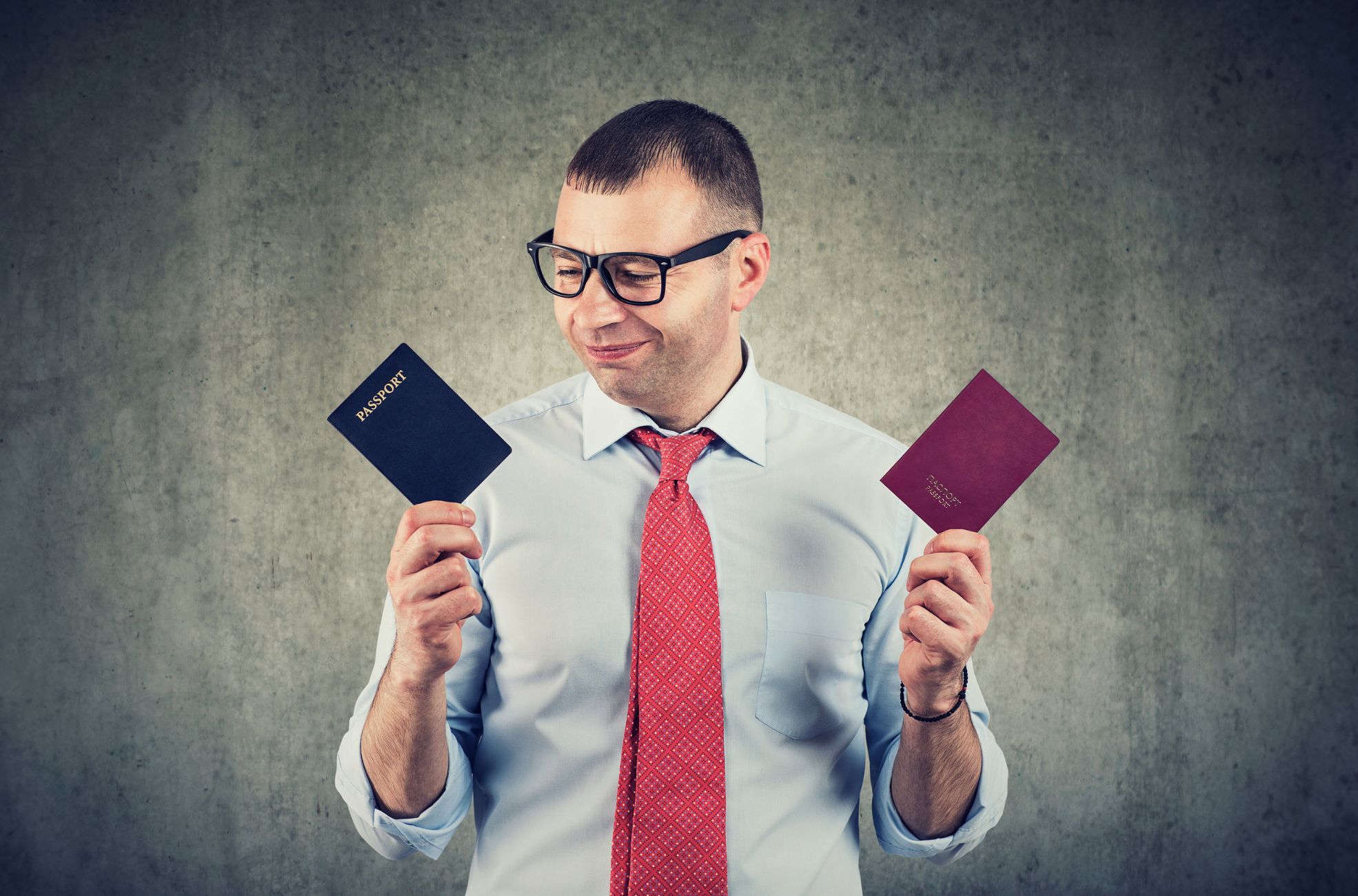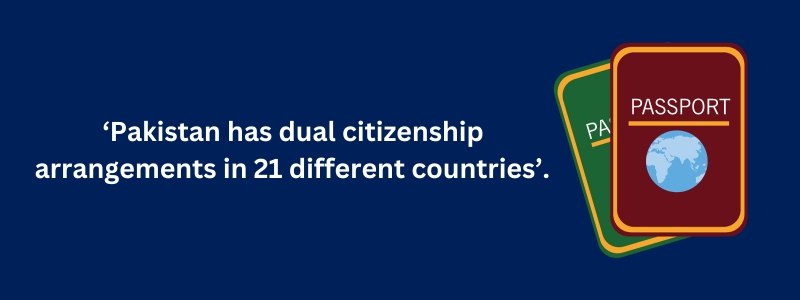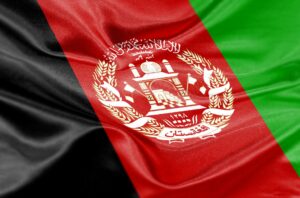Are you a Pakistani expatriate contemplating dual citizenship? Or a foreign national eyeing Pakistani citizenship? Either way, navigating through the legal aspects of Pakistani dual citizenship can be complex.
This comprehensive guide demystifies the concept of dual citizenship in Pakistan, drawing from historical perspectives, legal frameworks, and eligibility criteria. Furthermore, it explores investment routes for securing residencies and citizenship in other countries.
Dive in, and discover the potential advantages and implications of holding a dual nationality involving Pakistan.
Understanding Dual Citizenship in Pakistan
Definition of Dual Citizenship
Dual citizenship, or dual nationality, is a legal status where you’re simultaneously a citizen of two countries, allowing you to avail the benefits of both nations, such as economic rights, and other dual citizenship privileges availed such as the freedom to travel, own property, and access social services seamlessly in each country.”
But remember, not all countries allow dual citizenship, and the rules can differ significantly from those that do.
Importance of Citizenship in Pakistan
Being a citizen in Pakistan is essential. It gives you a sense of belonging and identity and comes with certain rights and responsibilities. For example, almost everyone born in Pakistan is automatically considered a Pakistani citizen.
Foreign nationals can also become Pakistani citizens after living in the country for at least five years and showing proficiency in at least one of the national languages.
You can enjoy various benefits if you’re a Pakistani with dual nationality. These include the ability to travel freely between both countries, own property in both nations, and access social services and benefits in both countries.
Historical Perspective of Dual Citizenship in Pakistan
The idea of dual citizenship in Pakistan has changed over time. At first, Pakistanis were British subjects until independent Pakistan made its nationality laws.
The independence of Bangladesh from Pakistan in 1971 left about half a million “Biharis” who traced their roots to the Bihar region. But in 2008, a court ruling gave the Pakistani Biharis complete voting and citizenship rights.
The Pakistan Citizenship Act of 1951 outlines the conditions for someone to hold Pakistani nationality. This Act also sets the terms for granting Pakistani citizenship. For example, suppose your parents or grandparents were born in the territories now included in Pakistan before the start of the Pakistan Citizenship Act of 1951, you would be a citizen of Pakistan by birth.
Country’s Regulations for Dual Citizenship
Pakistan recognizes dual citizenship under the Pakistan Citizenship Act of 1951. It allows its citizens to hold dual nationality with certain countries, subject to specific conditions and restrictions. To get dual citizenship in Pakistan, you must apply to the Directorate General of Immigration and Passports, including supporting documents and proof of eligibility.
Pakistan permits dual citizenship 21 countries, including the United Kingdom, France, Italy, Belgium, Australia, New Zealand, Canada, the United States of America, and others. If you’re a national of these countries, you don’t have to give up your nationality while getting Pakistani citizenship.
However, if you’re a Pakistani citizen residing outside of Pakistan (who’s not under 21 years old), and who holds citizenship of another country, you’re required to give up your Pakistani citizenship.
Residency and Citizenship
Besides dual citizenship, global residency and citizenship programs are available if you’re a Pakistani interested in residency or citizenship in other countries. These programs usually have specific requirements and criteria that you must meet. Some popular global residency and citizenship programs for Pakistanis include the Golden Visa program in Portugal, the Investor Visa program in the United Kingdom, and the Citizenship by Investment program in Malta.
These programs generally require you to make a significant investment in the country, like buying property or making a financial contribution. They also often have extra requirements, like a minimum stay requirement or a language proficiency test. So, you need to do your homework and understand the requirements and benefits of each program before applying. Talking with an immigration lawyer or specialist can also help navigate the process.
Dual citizenship and global residency and citizenship programs can give Pakistanis opportunities for greater mobility, better education and healthcare, social and economic rights, and the ability to expand their business and investment opportunities globally. But remember, you must carefully consider the implications and responsibilities of dual citizenship and residency in another country.

Eligibility for Dual Citizenship in Pakistan
Age Limit and Other Criteria
The Pakistan Citizenship Act of 1951 also provides for citizenship by descent. Suppose one of your parents is a citizen by descent. In that case, you must be registered at the nearest consulate or Pakistani mission. Children born to a Pakistani mother and a foreign national father after April 18, 2000, are also considered Pakistani citizens.
Legal Process for Applying
The process of becoming a Pakistani citizen can vary based on your circumstances. For instance, foreign women married to Pakistani nationals can become citizens. Similarly, Commonwealth citizens who transfer Rs.5 Million worth of Foreign Exchange can also acquire Pakistani citizenship.
However, Pakistani dual citizens residing abroad, who aren’t minors and possess citizenship of another country, are obligated to renounce their Pakistani citizenship. Children born overseas can maintain their dual citizenship until they reach 21, after which they must renounce their foreign citizenship, or their Pakistani one will be rescinded.
Pakistan HasDual Nationality Agreements with 21 Countries
- United Kingdom
- France
- Italy
- Belgium
- Iceland
- Germany
- Australia
- New Zealand
- Canada
- Finland
- Egypt
- Jordan
- Syria
- Switzerland
- Netherland
- United States of America
- Sweden
- Ireland
- Bahrain
- Denmark
- Norway
Nationals of these countries can retain their original nationality while acquiring Pakistani citizenship.
Role of Origin Country in Dual Citizenship
Being a dual national means being a citizen of two countries simultaneously. Each country has its own nationality laws based on its own policy. For instance, US citizenship law often doesn’t prevent its citizens from acquiring foreign citizenship, whether by birth, descent, naturalization, or other form of acquisition. As a US dual national, you owe allegiance to both the United States and the foreign country (or countries) and are obligated to obey the laws of both countries.
However, it’s worth noting that dual nationality can have both advantages and disadvantages. For instance, as a dual citizen, you enjoy certain benefits, such as the ability to live and work freely in two countries, own property in both, and easily travel between the countries. On the other hand, drawbacks of being a dual citizen include the potential for double taxation and the lengthy and costly process for obtaining dual citizenship. However, at Next Generation Equity, we will help you make this process much easier and clearer.
Best Citizenship By Investment Programs For Pakistanis
Real Estate Investment Visas
For those Pakistanis who can afford to invest in real estate, countries like Portugal, Spain, Malta, and Cyprus offer attractive opportunities for obtaining residency or citizenship. Caribbean nations like St. Kitts, Antigua, Grenada, and Dominica also provide appealing citizenship through investment programs. These typically require a minimum investment of around $100,000.
Acquiring a second citizenship or residency can take several months after the initial investment. Applicants must have a clean criminal record and sufficient funds for self-support.
The Citizenship by Investment market is a $30 billion industry globally.
Among the most sought-after programs for Pakistanis are those offered by Antigua and Barbuda, St. Kitts and Nevis, Vanuatu, Grenada, and St. Lucia.

Single Applicant Visas
St Lucia offers the most economical citizenship program for single applicants, while Antigua is the most affordable for families. St Kitts boasts the most powerful Caribbean passport in terms of visa-free travel. Countries like Grenada, Turkey, and Montenegro have an E-2 treaty with the United States, allowing citizens to apply for an E-2 non-immigrant visa to the United States.
The one-time donation to the national fund is a popular route for many investors. It’s also the most cost-effective and fastest way to apply for Citizenship by Investment, starting from $100,000. Government bonds/stocks are debt securities issued by governments. They are a favored investment route for those seeking safety with their investments.
Each of these countries, St.Kitts and Nevis, Grenada, St Lucia, Antigua and Barbuda, and Dominica, has its unique benefits and requirements. Therefore, thorough research and professional consultation are crucial to finding the best fit for individual needs.
Best Residency By Investment Programs for Pakistanis
Numerous nations, including Ireland, Canada, and the USA, offer residency and/or citizenship programs for Pakistani citizens. These programs often involve real estate investment or other financial commitments.
One of the significant advantages of obtaining a second passport is the convenience it brings to travel and visa applications. Countries like Portugal and Spain offer residency cards through real estate investment, which allows freedom of travel throughout the EU Schengen zone. Other countries like Malta and Cyprus offer fast-track second passport options. Caribbean countries like St. Kitts, Antigua, Grenada, and Dominica also allow Pakistani citizens to apply for a second passport, providing visa-free travel to many countries.
EB-5 US Immigrant Investor Visa Program
The EB-5 US, Immigrant Investor Visa Program, is another option available to residents of Pakistan. This program requires an investment of at least $1.05 million in a targeted employment area (TEA). The investment can be made directly through a USA Regional Center project or in a new business. The investment must create and maintain 10 full-time jobs for a minimum of two years.
The EB-5 program allows for 10,000 visas to be issued each year. Pakistani investors have been successful in obtaining EB-5 visas, with 24 visas issued to Pakistani investors in FY 2022.
Pakistan is also considering launching its own citizenship-by-investment program. This program would grant permanent residency and, eventually, citizenship to foreign investors who make investments worth at least a million dollars in the country. The proposed program aims to attract foreign investors worldwide, not just limited to specific countries. The eligibility criteria and details of the program are still being finalized.
Understanding Dual Citizenship and Residency by Investment
Residency by Investment is a process where you can obtain permanent residency in another country by investing significantly in that country’s economy. This could be through real estate investment, property ownership, or other investment forms. As a permanent resident, you have the right to live, work, study, and access healthcare in the host country. However, you’re typically not entitled to vote or run for office.
You might consider investing in permanent residency or citizenship for numerous reasons. For one, it can offer increased global mobility, especially if you’re from a country with a restrictive passport. It can also open up new business and trade opportunities, as you can do business in the host country and travel abroad more easily. Additionally, permanent residency can offer advantages for tax optimization, as some countries have lower tax rates than others.
The UAE Golden Visa Scheme
The United Arab Emirates (UAE) offers a Golden Visa scheme that allows foreign investors, including Pakistani citizens, to obtain a second passport and citizenship in return for economic investment. This program has become popular among financially strong individuals from various countries, including Pakistan.
The UAE Golden Visa offers several benefits, including better access to international travel, a safe and secure environment, investment opportunities in a thriving economy, and access to world-class education and healthcare.
Family members can also be included in the Golden Visa application, and individuals can have 100% ownership of their business ventures in the UAE.
The UAE offers two types of residency visas: a 10-year term visa and a 5-year term visa. The eligibility criteria and requirements for these visas depend on the individual’s investment in the UAE. Investors can either invest a minimum amount of $2,722,570 in the public sector or invest in real estate property in the UAE.
Other Residency and Citizenship Programs
Other countries offering residency and citizenship programs for Pakistani citizens include Turkey, Portugal, Greece, Malta, Spain, Canada, USA, Antigua & Barbuda, St Lucia, Grenada, St Kitts, Dominica, Ireland, and Vanuatu. Each country has different investment requirements and benefits, such as visa-free travel to multiple countries, access to the EU Schengen Zone, and the ability to sponsor family members.
Next Generation Equity is a government-approved facilitator of Residence and Citizenship by Investment, offering expert advice on various programs around the world. We also assist international clients in obtaining residence and citizenship under these programs.
Future Implications of Pakistan Dual Citizenship
As we delve into the potential future implications of dual nationality in Pakistan, it’s essential to consider the influence of immigration trends and globalization on this status.
Immigration Trends Impacting Dual Citizenship
Immigration trends have a significant impact on dual nationality.
For instance, in the 1990s, several Latin American countries, including Colombia, the Dominican Republic, Ecuador, Costa Rica, and Brazil, revised their nationality laws to allow their expatriates to become naturalized in the receiving country without renouncing their original nationality.
These changes increased naturalization rates, particularly among immigrants with high school or higher education. This suggests that dual nationality rights increase the propensity to naturalize and foster economic assimilation.
Globalization and Dual Citizenship
The role of globalization in shaping dual nationality is also noteworthy. The increased cross-border flow of goods, services, money, ideas, and people has led to economic integration and interdependence among nation-states, redefining the traditional concept of nationality.
In this context, dual nationality has become more prevalent, with individuals holding nationality in more than one country. This trend is particularly noticeable in countries with high immigration rates, such as the US, Canada, Australia, and most Latin American countries, which grant nationality unconditionally to all persons born in their territory and to the children of their citizens born abroad.
Changes in Legal Framework
Alterations in the legal framework surrounding dual nationality privileges have also had significant implications. For instance, changes in dual nationality laws have been associated with employment gains and a lower likelihood of receiving income from welfare. This suggests that dual nationality rights might facilitate the process of immigrants’ labor market assimilation.
Moreover, the introduction of dual nationality rights by countries like Pakistan and India has allowed their expatriates in the US to retain nationality despite naturalization elsewhere. This policy shift has had critical symbolic repercussions for nationality.
Impact on Future Generations
The influence of dual nationality also extends to future generations. The decision to apply for dual nationality arrangements depends on the perceived benefits and costs of naturalization. Dual nationality rights decrease a significant cost of naturalization, specifically, the need to renounce rights in the country of origin.
This has implications for future generations, as it affects the immigration “multiplier” – the number of prospective immigrants who come to the US as the result of the admission of one current immigrant. As these factors continue to evolve, so too will the implications of dual nationality.

Final Thoughts on Dual Citizenship and Global Programs
In this comprehensive guide, we’ve explored the implications of dual nationality in Pakistan and the variety of global residency and citizenship programs available for Pakistanis. Dual citizenship and residency programs allow you the freedom of travel and many different options. From business opportunities to access to better healthcare and education, having dual nationality has its benefits.
When considering this decision, due diligence, guided by expert advice, is key. Whether you’re a Pakistani seeking dual citizenship or scouting for residency or citizenship programs abroad, remember that the landscape of global citizenship is constantly changing.
We are here to help guide you through the complexities of it all and help you gain your second passport.





